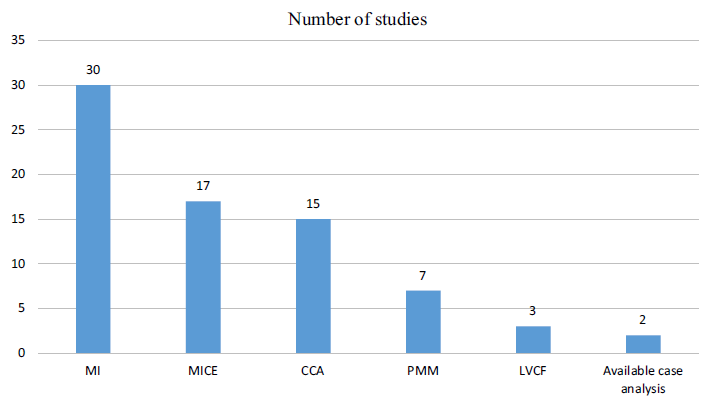That’s the questioned answered in a paper by Mukherjee et al. (2023). The authors outline an “HEOR research” for this paper as
…real-world proof research that performed a secondary/post-hoc evaluation utilizing randomized
managed trial (RCT) knowledge, and a within-trial cost-utility evaluation through which the end result of curiosity was prices or PROs together with preference-based utilities (e.g., EQ-5D).
Essentially the most applicable strategy for imputing lacking knowledge is dependent upon the assumptions about how the info are lacking:
- Lacking fully at random (MCAR): the noticed or unobserved values of all variables in a research shouldn’t have any affect on the likelihood of an commentary being lacking
- Lacking at random (MAR). The likelihood of lacking knowledge for a specific variable is related to the noticed values of variables (both noticed values of different variables within the dataset or noticed values for a similar variable at earlier timepoints) within the dataset, however not upon the lacking knowledge. One can not take a look at for whether or not MAR holds in a dataset.
- Lacking Not at Random (MNAR). On this case, the likelihood of lacking knowledge for a specific variable is said to the underlying worth of that particular variable. MNAR will be ignorable (when lacking values happen independently of the info assortment course of) or non-ignorable (when there’s a structural trigger to the missingness mechanism that is dependent upon unobserved variables or the lacking worth itself).
To deal with the lacking knowledge, varied strategies can be found together with: complete-case evaluation (CCA), available-case (AC) evaluation, a number of imputation (MI), a number of imputation by chained equation (MICE), and predictive imply matching.
To higher perceive which approaches are generally utilized in well being economics and outcomes analysis (HEOR), the authors performed a scientific literature evaluate in PubMed and examined what sort of statistical strategies have been used to handle lacking value, utility or patient-reported consequence measures.
The authors discovered that a number of imputation, a number of imputation by chained equation and complete-case analyses have been mostly used:
From 1433 recognized data, 40 papers have been included. 13 research have been financial evaluations. Thirty research used a number of imputation with 17 research utilizing a number of imputation by chained equation, whereas 15 research used a complete-case evaluation. Seventeen research addressed lacking value knowledge and 23 research handled lacking consequence knowledge. Eleven research reported a single methodology whereas 20 research used a number of strategies to handle lacking knowledge.

The authors observe that whereas they discovered a considerable amount of HEOR methodological literature on tips on how to deal with lacking knowledge in a RCT context; nevertheless, there have been only a few research which have tried to truly implement these suggestions and impute the lacking knowledge. You possibly can learn the complete article right here.
